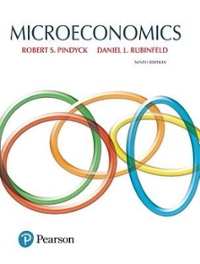Answered step by step
Verified Expert Solution
Question
1 Approved Answer
Suppose that a beekeeper makes honey, which she sells in a competitive market with an equilibrium price P H = 20. The total cost of
Suppose that a beekeeper makes honey, which she sells in a competitive market with an equilibrium price P H = 20. The total cost of producing honey is T CH = H2 + 8H, where H denotes the quantity of honey produced. The beekeeper is located next to an orchard that grows apples that the orchard owner sells on a competitive market at a price P A = 40. The total cost of producing apples is T CA = 2A2 + 48A 2HA, where A denotes the quantity of apples. Note that the cost of producing apples depends on the amount of honey. The idea is that more honey requires more bees, and the more bees there are, the easier it is to grow apples. The benefit that bees provide to the orchard is a classic example of an externality
Step by Step Solution
There are 3 Steps involved in it
Step: 1

Get Instant Access to Expert-Tailored Solutions
See step-by-step solutions with expert insights and AI powered tools for academic success
Step: 2

Step: 3

Ace Your Homework with AI
Get the answers you need in no time with our AI-driven, step-by-step assistance
Get Started


